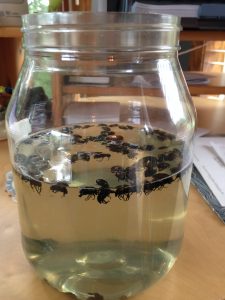Creation / Ordinary Life / Safe Place / Work and Rest
Calm down!

If it were up to me I’d be blasting judgment from my throne. I would wipe out – the Zika virus, the ex-president of FIFA and the Japanese beetles attacking my garden. This summer we wonder how bad can it get? We are horrified by violence. Helpless in the face of corruption and crime, death and politics. Why does God allow it? With murderous thoughts for all the evil in this world, little of which touches my life I admit, I shake beetles from the vines and drown them in soapy water. On the frontline of this battle where dozens congregate in a frenzy of mating – I am losing. My grapevine is ravaged. My pole beans are dying. My dear William Baffin climbing rose is reduced to brown ragged leaves by little green worms and beetles are eating what’s left. They seem to prefer elevation because the low-growing Dragon Tongue beans have escaped their notice. The beans are wide and flat with rosy splotches on a creamy yellow background. They are pretty, tender, tasty, and this year they are prolific. I throw them into a cast iron skillet with garlic salt and a little butter, cover and saute them slowly until they are slightly caramelized. I try to be positive, but I’m mad. I hate Japanese beetles. Granted a righteous anger exists, but I doubt I’ve mastered it: “Refrain from anger and turn from wrath; do not fret – it only leads to evil.” (Ps. 37:8) Aargh.

By now I planned to be a much better person than one who can’t stand up to attack or is capsized by every trouble great or small. It’s disappointing to find I still don’t have Hinds Feet on High Places. Tsk. (I didn’t like that book anyway.) What I seem to need over and over are reminders of who’s in control here.
Lately, in a much needed remedy, I placed myself under the mentor- ship of the Psalms – to practice better listening to God and pray- ing them back to him. Eugene Peterson exhorts us to do thus in his little book Answering God: The Psalms as Tools for Prayer.
The Psalms apparently weren’t invented for my whimsical heart and pinched brain. What? But
I thought they were! For years
I’ve cherry-picked verses that speak to my circumstances and leave others out. Peterson calls this Psalmectomy. Whether I am happy as a dog rolling in a manure pile (trust me, our childhood dogs loved it) or sad as a mother who has lost her baby, the Psalms have existed for thousands of years as a means by which God’s people learn to respond to life by taking them, all of them, before God not accord- ing to our emotions or current circumstances, but methodically one by one, line by line.
This recent effort exhumed a comforting new idea from Peterson that expressed something so true I almost laughed. Oh, wait. I did.
Peterson writes: “There is a pseudo-prayer that promises its practitioners entrance into the subliminal harmonies of the way-things-are, putting them in tune with the general hum of the universe. This so-called prayer reduces tension, lowers stress, and extends longevity. The people who get good at it are calm, their voices soothing, and their actions poised. They meditate beautiful thoughts and sleep well. They cultivate the way of peace … Psalm-prayer also enters into the-way-things-are, but finds that the way-things-are is pretty bad.” (p. 95)
Yes. Yes. I agree “the way-things- are is pretty bad.” I’ve often felt guilty for not being able to get a grip on emotions and CALM the heck down. I’ve always strove (striven?) to find a zen-like place of calm and peace in the midst of bad news and everyday trouble. I have taken slow deep breaths twenty at a time. I’ve listened to an app that softly chimes and gently fades into ocean waves. Yeah. I’ve repeated memorized scripture. I pray. I’ve taken supplements designed to …. I mean, what have you done? Surely you’ve tried remedies? There must be a thousand cures for calming your thoughts and sleeping at night. I’m not saying you shouldn’t try them or that these things don’t work to some degree. But for me? Not so much. I turn a corner and boom I’m at the mercy of some problem and can’t find the power to keep humming along. “The way-things-are is pretty bad.” What a relief. Peterson gets this.
An overview of the Psalms reveals they are incredibly cyclical. Thousands of years ago the Psalms were divided into five separate books similar in cadence. They all belong in God’s word because they are the means by which the church has always and ever been expected to live in prayer before God. So rather than beating myself up because c’mon, Margie, don’t you think that by now IF you were a serious Christian, you would be spiritually above it all? The Psalms cry out a resounding NO! The Psalm writers repeatedly move from anger and depression and questioning life and God to erupt- ing in praise. Often the change in the text is so abrupt it is like an airbag detonated in your face. The amazing thing is how this pattern repeats itself over and over again.
Why is this so? Well, it takes more space than I have to set down a convincing argument, I suppose. But start with this? If David, the shepherd, guerrilla fighter, court musician and king loved God so utterly that God said of him “I have found David son of Jesse a man after my own heart.” Acts 13:22) – if David wrote round after round of Psalms-cycles throughout his whole life, shouldn’t we accept that we might experience the same pattern? Because God knows we
need to keep punching the repeat button?
I think of the Lord’s Supper instituted by Christ and repeated regularly: Why didn’t Jesus tell us once was enough? Because we easily forget what was done for us and why. So the Psalms cry out with tears and doubts again and again but they also lead us toward trusting and believing in God’s love for us despite circumstances.
If we look at Psalm 10, for example, it begins with something we may feel to some degree every day – complaints because it looks like God doesn’t care a whit about what’s going on. “Why, O Lord, do you stand far off? Why do you hide yourself in times of trouble?” (vs 1). We watch the world and can’t understand why the wicked are allowed to exist. The Psalmist points this out to God: “His ways are always prosperous; he is haughty and your laws are far from him; he sneers at all his enemies. He says to himself, ‘Nothing will shake me; I’ll always be happy and never have trouble.’ His mouth is full of curses and lies and threats; trouble and evil are under his tongue.” (vs 5-7). There is more. But suddenly the writer switches from accusations and doubts and asserts: “But you O God, do see trouble and grief; you consider it and take it in hand. The victim commits himself to you; you are the helper of the fatherless.” (vs 14). And soon the Psalmist will say to God: “I trust in your unfailing love, my heart rejoices in your salvation. I will sing to the Lord for he has been good to me.” (13:5-6)
Another thing I’ve missed is that the Psalms were not written for my private devotions. Peterson asserts “Prayer begins in community.” So as I pray, whether alone or not, I step into a great stream of people using the same words as those who have worshiped together for centuries, originally led by the Levites and the choirmasters pray- ing and singing with the Israelites. Together with the body of Christ I can honestly complain and cry. I can be fully human and yet some- how be led to praise whether I feel like it or not and to the knowledge that I’ve been made righteous by God’s tender mercies.
And finally there is this: “…be silent.” (Ps. 4:4) “Nothing more need be said. No explanations, no boasts, no apologies. This is who you are. There is something more important than liking or not liking yourself, more significant than the day’s accomplishments and failures; there is you. In the silence, simply be the person that God is gathering into salvation.” (p. 64) God is in control of all things including the renovation of your soul.
(This essay first appeared in Letters From the House Between #3 2016.)

